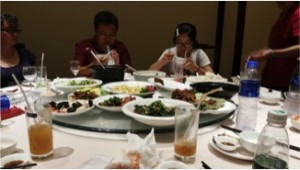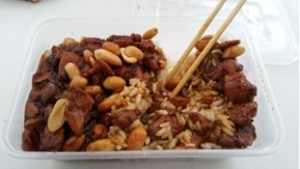Who doesn’t like Chinese food? American Chinese food is mouthfuls of steaming rice and noodles with sides of delectable meats and veggies and to cap it all off, a fortune cookie. Most American Chinese food places I have gone to served their food with fried rice or lo mein by a woman who works the front of the house. Since China has such a long historical and storied past, I have often wondered about their food cultures around food service especially in the country of China. Is what we eat at American Chinese restaurants representative of what traditional Chinese families eat in China? Coming to Shanghai, rice is oddly not present as much as I am used to.

Growing up in a Nigerian household, I am not only the first of five siblings but the oldest male. I will be first to carry my father’s name and to represent my family in whatever I do. I am a physical representation of my family’s heritage and family line. In Nigerian culture the oldest child represents the family on many fronts, but the oldest male is a strong representation of the father and the family. Fathers are very important in Nigerian culture and its food culture. In traditional Nigerian food culture, males eat first serviced by wives, sisters, and daughters. Rice is always present when you take part in a Nigerian meal, especially large scale meals.

In American Chinese food, rice always accompanies your choice of meat and your choice of a side dish. Rice is in abundance with American Chinese dishes for all family members partaking in the meal. Recently the question came up, why is rice never a part of the meals we order and must be ordered separately. We were told by a student that in her family men are seen as having a larger appetite and eat more, so men usually order rice as a part of their meal and the women eat the other food ordered and most times never touch the rice. This was interesting because something else about meal times made sense all of a sudden. The fact that every time we went out as a group to eat, all 10 of us, any and every restaurant would leave us one drink menu an one food item menu for us to order from. China is traditionally a patriarchal society, and the men make the decisions for the family. The man is supposed to order the food and drink for all the family members at the table. Men are seen at dinner as the voice of decision. They are the head of their households and they are the decision makers at the dining table.
Before coming to Shanghai, my experience in family dynamics as a first generation Nigerian-American was twofold. American culture when it comes to ordering food is that everyone orders what they want and the sequence of when people order varies. I have seen it a plethora of mixed up ways in which families order from parents first to children first. So in general, my impression is America does not necessarily care who orders when.

Now this does not represent all American families because in my household, traditionally Nigerian men are the leaders and decision makers of the family. Nigeria is a patriarchal society as well. In Nigeria, food preparation equals women, wives and daughters alike taking part in food prep and the serving of the food. Men in Nigeria are served first by their wife and daughters, then the children are served next if they are too young to help cook the food, and then the women who cooked eat. In more affluent families, there may be a maid of some sort who serves the food but the man will still be served first. In my American household some of those ideals still hold true most likely due to my parents’ upbringing in Nigeria, but not all ideals. Everyone cooks in my house; the order in which people eat depends on availability. If my mother cooks and if my father is nearby he will get his food first most times but if not, it’s first come first served. The American mix and match order of service comes into play.
Food and the service of it is like a transfer of power and energy not only in the literal sense but also in the societal sense because the sequence in which people get food appears to equate to gender power roles. Here in Shanghai gender roles come down to what is feminine and what is masculine. Not many women are seen smoking because it is seen as “unladylike.” I have noticed that men, especially smokers, hack up spit everywhere all the time. I haven’t seen any women doing that. Women and girls here walk around holding up umbrellas to block the sun from their skin. This makes me wonder how the dynamics are viewed in single parent households in China or households where the woman makes the “lion’s share” of the income.

The differences in societies and cultures are the key to what makes each one so great and unique. So is it okay to say one is better than the other or backwards? I don’t think it is that black and white. Each cultural history one can ever take part in is heavily intertwined with its food. A country’s food culture can tell you so much about its customs, history, and ideals. So does that mean rice in traditional Chinese culture equates to much more than we Americans can comprehend in two weeks? Can a simple grain such as rice represent wealth and power? American eat so much of it, can it represent greed and excess? Rice is a staple in Nigerian cuisine, so does rice just represent availability of a resource? Rice is in so many cuisines of many countries and cultures, so does rice represent our connectedness as human beings? These are many of the questions that come up when talking about the subject not only of rice and men, but food and people.








